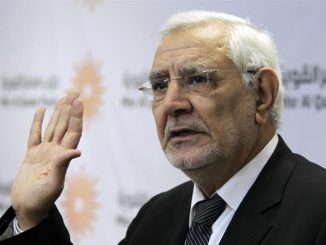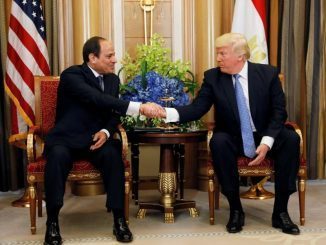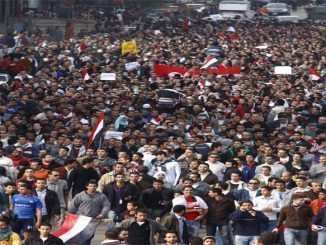
Members of Egyptian national security agency listed as potentially responsible for killing the Italian student student Giulio Regeni
The move comes after a meeting, the 10th of its kind, between Rome’s deputy public prosecutor Sergio Colaiocco and Egyptian authorities in Cairo.
The prosecution in Rome decided to proceed on its own, listing several members of Egypt’s national security agency as potentially responsible for the alleged torture and murder of the student, Italian prosecutors told the Guardian.
Reports in multiple Italian news outlets detail how the Italian prosecutors were frustrated by a lack of progress in the investigation following Colaiocco’s visit to Cairo. On his return to Italy, they added the names of Egyptian security officials to the preliminary list of suspects.
Regeni disappeared on 25 January 2016, and his body was found bearing signs of torture on an outlying Cairo desert road on 4 February that year, generating suspicions that Egyptian officials were involved in his disappearance and his death.
Earlier this year, the Rome prosecutor, Giuseppe Pignatone, stated that he believed Regeni was killed because of his research, which focused on trade unions in Egypt. His death provoked a significant break in Italian-Egyptian relations, with Italy recalling its ambassador to Cairo between April 2016 and September last year.
The Egyptian authorities initially provided a variety of explanations for Regeni’s death, including claims that he was killed as part of an antiquities smuggling ring, or due to his sexual activities.
Five men alleged to be members of a gang that the Egyptians initially claimed murdered Regeni were gunned down by Egyptian security forces on the outskirts of Cairo in March 2016, and were later exculpated by the public prosecutor.
The list of potential suspects includes Major Sherif Magdy Abdel Aal and Osman Helmy of Egypt’s national security agency, believed to be two of the officers who recruited the head of the Egyptian street vendors’ union Mohammed Abdullah to spy on Regeni during his research, according to Corriere della Sera and la Repubblica.
Abdullah secretly filmed Regeni during a meeting, attempting to goad the student into providing funds for his personal use. The footage was later aired on Egyptian television.
“He was asking too many questions,” Abdullah told l’Espresso, suggesting he had mistaken Regeni for a spy. Abdullah told the Guardian in September 2016: “Regeni spoke to me about things which I thought were of concern to national security.”
Abdel Aal also ordered the arrest of Ahmed Abdullah – not a relative of Mohammed Abdullah – head of the board of trustees for the Egyptian commission for rights and freedoms (ECRF), whose lawyers act as the Egyptian legal counsel for the Regeni family. Abdullah was imprisoned after five months in pre-trial detention in 2016, accused of a range of charges including calling to overthrow the regime, incitement to violence and belonging to a terrorist group. His supporters have long believed that the charges were falsified, and intended to dissuade ECRF from working on the Regeni case.
In a statement on Thursday, Regeni’s family expressed their gratitude to prosecutors in Rome for their efforts to identify “some of the men responsible for torturing and killing Giulio”.
They said: “We trust that the investigation against these men will finally uncover the truth that we have been pursuing for 34 months.’’
Italian prosecutors previously expressed suspicions that Regeni had been followed by officers from the Egyptian national security agency, yet were frustrated by a lack of collaboration from Cairo to identify them.
Corriere della Sera highlighted how Italian intelligence had been working to triangulate Regeni’s movements with those of Egyptian security officials, in particular five agents from the national security agency who they believe tailed Regeni until 22 January 2016, three days before his disappearance, resuming their work on the day the researcher disappeared on his way to meet a friend. The five allegedly include Abdel Aal and Helmy.
CCTV footage from the Cairo metro on the night Regeni disappeared contained significant and unexplained gaps when provided to the Italian authorities this year, according to Italian prosecutors. After two years of attempts to obtain the footage as well as phone records and other evidence, a lack of progress from the Egyptian side fuelled a rupture between the two teams of investigators, causing the Italians to push forward with their side of the investigation and place Egyptian officials on the list of suspects.
Prosecutors in Rome declined to make any statements when contacted by the Guardian. Regeni’s lawyer, Alessandra Ballerini, also declined to comment. On Thursday, Roberto Fico, the president of the Italian chamber of deputies, said Italy had “suspended diplomatic talks with the Egyptian parliament until the case is solved”.
Despite repeated claims by Egyptian president Abdel Fatah al-Sisi of his “strong will” to bring Regeni’s killers to justice, Egyptian officials have remained largely tight-lipped about the case, amid suspicion there is little desire in Cairo to see the investigation progress.
Both the Giza public prosecutor, Ahmed Nagy, who has overseen the Regeni case since his disappearance, and the Egyptian ministry of foreign affairs, did not respond when contacted by the Guardian to comment on the updated list of suspects.



